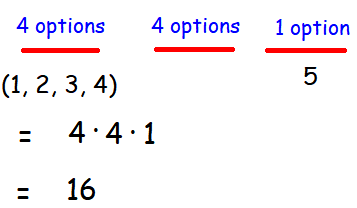HOW MANY 3 DIGIT NUMBERS CAN BE FORMED WITH GIVEN DIGITS
Question 1 :
Count the numbers between 999 and 10000 subject to the condition that there are (i) no restriction. (ii) no digit is repeated. (iii) at least one of the digits is repeated
Solution :
The numbers lie between 999 to 10000 must be a 4 digit number.
__ __ __ __
(i) no restriction.
Thousands place :
Other than 0, we have 9 options to fill up the thousands place.
Hundreds place :
Including 0, we have 10 options.
Tens place :
Including 0, we have 10 options.
Unit place :
Including 0, we have 10 options.
Hence total numbers lie between 999 and 10000 is
9 ⋅ 10 ⋅ 10 ⋅ 10 = 9000
(ii) no digit is repeated.
Thousands place :
Other than 0, we have 9 options to fill up the thousands place.
Hundreds place :
Here we may accept 0, but we should not use the number that we have already used in the thousands place. So, we have 9 options.
Tens place :
We have 8 options.
Unit place :
We have 7 options.
So, the total numbers are
9 ⋅ 9 ⋅ 8 ⋅ 7 = 4536
(iii) at least one of the digits is repeated
At least one of digits is repeated means, we may have one repeated digit, two repeated digits or more.
In order to find the answer for this question, we have to subtract no digits repeated from total numbers.
Hence the answer is 9000 - 4536 = 4464.
Question 2 :
How many three-digit numbers, which are divisible by 5, can be formed using the digits 0, 1, 2, 3, 4, 5 if (i) repetition of digits are not allowed? (ii) repetition of digits are allowed?
Solution :
___ ___ ___
(i) repetition of digits are not allowed?
Case 1 :
If we use 0 in the unit place, we will have only one option.
In tens place, we will have 5 options.
In hundreds place, we will have 4 options.

Case 2 :
If we use 5 in the unit place, we will have only one option.
In hundreds place other than 0 and 5, we will have 4 options.
In tens place, we will have 4 options including 0.

Hence total numbers formed = 20 + 16 = 36 numbers
(ii) repetition of digits are allowed?
Unit place :
Since the required numbers are divisible by 5, it ends with 0 or 5. So, we have 2 options.
Hundreds place :
Other than 0, we will have 5 options.
Tens place :
Sine the repetition is allowed , we have 6 options.
Hence total numbers to be formed = 5 ⋅ 6 ⋅ 2
= 60 numbers
Kindly mail your feedback to v4formath@gmail.com
We always appreciate your feedback.
©All rights reserved. onlinemath4all.com
Recent Articles
-
Digital SAT Math Problems and Solutions (Part - 150)
Apr 25, 25 11:46 AM
Digital SAT Math Problems and Solutions (Part - 150) -
AP Calculus AB Problems with Solutions (Part - 19)
Apr 24, 25 11:10 PM
AP Calculus AB Problems with Solutions (Part - 19) -
AP Calculus AB Problems with Solutions (Part - 18)
Apr 24, 25 11:06 PM
AP Calculus AB Problems with Solutions (Part - 18)
